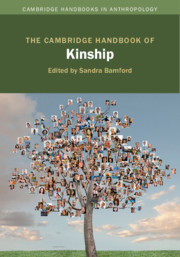
-
Select format
-
- Publisher:
- Cambridge University Press
- Publication date:
- April 2019
- May 2019
- ISBN:
- 9781139644938
- 9781107041189
- 9781107697744
- Dimensions:
- (247 x 174 mm)
- Weight & Pages:
- 1.44kg, 750 Pages
- Dimensions:
- (244 x 170 mm)
- Weight & Pages:
- 1.27kg, 752 Pages
You may already have access via personal or institutional login
Book description
Presenting twenty-nine original chapters - each written by an expert in the field – this Handbook examines the history of kinship theory and the directions in which it has moved over the past few years. Using examples from across the globe (Africa, India, South America, Malaysia, Asia, the Pacific, Europe and North America), this Handbook highlights the power of kinship theory to address questions of broad anthropological significance. How have recent advances in reproductive medicine fundamentally altered our understanding of biological properties? How has globalization brought in its wake new ways of imagining human relatedness? What might recent shifts in state welfare policies tell us about those relations of power that define the difference between 'functional' versus 'dysfunctional' families? Addressing these and many other timely concerns, this volume presents the results of cutting edge research and demonstrates that the study of kinship is likely to remain at the core of anthropological inquiry.
Reviews
‘Long considered one of the classic issues of comparative anthropology, kinship has sometimes been seen as an out-of-date reference to a disappearing world. More than any other recent book, this Cambridge Handbook succeeds in bringing kinship firmly back on the agenda, demonstrating the hyper-relevance of genealogical concerns and frameworks through which anthropology and related fields can fruitfully address new biosocial realities.'
Gísli Pálsson - University of Iceland
‘This marvelous collection of essays attests the vitality, breadth and depth of contemporary kinship studies and shows how kinship, contrary to earlier predictions of its demise, is alive and kicking. The volume brings together work from some of the most knowledgeable scholars in the field who, in consolidating their research thus far, map the state of the art and reveal not only the workings of kinship in an interconnected world, but also how it cannot be isolated from other pressing social and political questions of our time.'
Jeanette Edwards - University of Manchester
Contents
Metrics
Altmetric attention score
Full text views
Full text views help Loading metrics...
Loading metrics...
* Views captured on Cambridge Core between #date#. This data will be updated every 24 hours.
Usage data cannot currently be displayed.
Accessibility standard: Unknown
Why this information is here
This section outlines the accessibility features of this content - including support for screen readers, full keyboard navigation and high-contrast display options. This may not be relevant for you.
Accessibility Information
Accessibility compliance for the PDF of this book is currently unknown and may be updated in the future.


